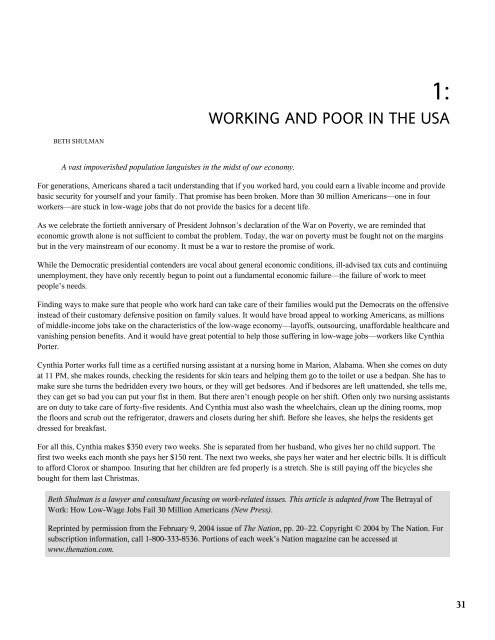Getting Started in Sociology, 3rd Edition - Latest Downloads
Getting Started in Sociology, 3rd Edition - Latest Downloads
Getting Started in Sociology, 3rd Edition - Latest Downloads
You also want an ePaper? Increase the reach of your titles
YUMPU automatically turns print PDFs into web optimized ePapers that Google loves.
BETH SHULMAN<br />
A vast impoverished population languishes <strong>in</strong> the midst of our economy.<br />
1:<br />
WORKING AND POOR IN THE USA<br />
For generations, Americans shared a tacit understand<strong>in</strong>g that if you worked hard, you could earn a livable <strong>in</strong>come and provide<br />
basic security for yourself and your family. That promise has been broken. More than 30 million Americans—one <strong>in</strong> four<br />
workers—are stuck <strong>in</strong> low-wage jobs that do not provide the basics for a decent life.<br />
As we celebrate the fortieth anniversary of President Johnson’s declaration of the War on Poverty, we are rem<strong>in</strong>ded that<br />
economic growth alone is not sufficient to combat the problem. Today, the war on poverty must be fought not on the marg<strong>in</strong>s<br />
but <strong>in</strong> the very ma<strong>in</strong>stream of our economy. It must be a war to restore the promise of work.<br />
While the Democratic presidential contenders are vocal about general economic conditions, ill-advised tax cuts and cont<strong>in</strong>u<strong>in</strong>g<br />
unemployment, they have only recently begun to po<strong>in</strong>t out a fundamental economic failure—the failure of work to meet<br />
people’s needs.<br />
F<strong>in</strong>d<strong>in</strong>g ways to make sure that people who work hard can take care of their families would put the Democrats on the offensive<br />
<strong>in</strong>stead of their customary defensive position on family values. It would have broad appeal to work<strong>in</strong>g Americans, as millions<br />
of middle-<strong>in</strong>come jobs take on the characteristics of the low-wage economy—layoffs, outsourc<strong>in</strong>g, unaffordable healthcare and<br />
vanish<strong>in</strong>g pension benefits. And it would have great potential to help those suffer<strong>in</strong>g <strong>in</strong> low-wage jobs—workers like Cynthia<br />
Porter.<br />
Cynthia Porter works full time as a certified nurs<strong>in</strong>g assistant at a nurs<strong>in</strong>g home <strong>in</strong> Marion, Alabama. When she comes on duty<br />
at 11 PM, she makes rounds, check<strong>in</strong>g the residents for sk<strong>in</strong> tears and help<strong>in</strong>g them go to the toilet or use a bedpan. She has to<br />
make sure she turns the bedridden every two hours, or they will get bedsores. And if bedsores are left unattended, she tells me,<br />
they can get so bad you can put your fist <strong>in</strong> them. But there aren’t enough people on her shift. Often only two nurs<strong>in</strong>g assistants<br />
are on duty to take care of forty-five residents. And Cynthia must also wash the wheelchairs, clean up the d<strong>in</strong><strong>in</strong>g rooms, mop<br />
the floors and scrub out the refrigerator, drawers and closets dur<strong>in</strong>g her shift. Before she leaves, she helps the residents get<br />
dressed for breakfast.<br />
For all this, Cynthia makes $350 every two weeks. She is separated from her husband, who gives her no child support. The<br />
first two weeks each month she pays her $150 rent. The next two weeks, she pays her water and her electric bills. It is difficult<br />
to afford Clorox or shampoo. Insur<strong>in</strong>g that her children are fed properly is a stretch. She is still pay<strong>in</strong>g off the bicycles she<br />
bought for them last Christmas.<br />
Beth Shulman is a lawyer and consultant focus<strong>in</strong>g on work-related issues. This article is adapted from The Betrayal of<br />
Work: How Low-Wage Jobs Fail 30 Million Americans (New Press).<br />
Repr<strong>in</strong>ted by permission from the February 9, 2004 issue of The Nation, pp. 20–22. Copyright © 2004 by The Nation. For<br />
subscription <strong>in</strong>formation, call 1-800-333-8536. Portions of each week’s Nation magaz<strong>in</strong>e can be accessed at<br />
www.thenation.com.<br />
31


